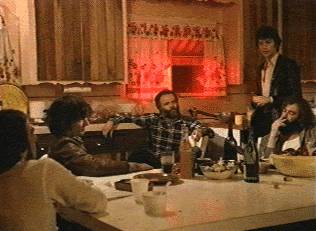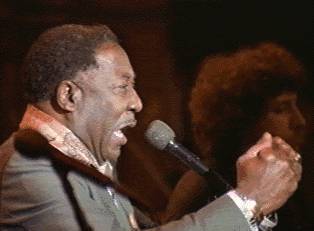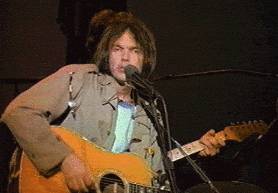
The Band. One of the greatest groups of their (or any) era; The Band released two unquestionable masterpiece records, Music From Big Pink and The Band, then tried in vain to recapture that magic for the rest of the 1970's, and finally folded for all intents and purposes in 1976. (They did release some things afterwards, and regrouped without Robbie Robertson in the 1980's and 90's...but as far as The Band when they really mattered, they folded their tent in '76). This most Americana of bands was comprised of four Canadians and one Arkansan. They cut their teeth playing jukes and dives across Canada and the U.S., until Bob Dylan finally plucked them from obscurity to be his backing band on his seismic first electric tour in the mid-60's (the one that changed the course of rock history). They were worshiped like few other bands by their fellow musicians. Eric Clapton to this day insists that merely listening to The Band’s debut was one of the main inspirations for folding Cream. Clapton even traveled to their communal home/studio in Woodstock (the 'Big Pink' referenced in the title of their debut) and asked them if he could join as their guitarist. Not too keen on the competition, Robertson told him "no thanks."
Key to The Band’s greatness was the integrated approached they took. Each member was a multi-instrumentalist, and they also boasted three expressive and unique singers. Robbie Robertson wrote most of their original material. Charges of dictatorial tendencies aside, Robbie insists that he begged the troubled Richard Manuel to share the songwriting burden (Manuel equally shared the songwriting on the debut); but Manuel was creatively spent after that first record and was satisfied to sit back and play keyboards, occasionally drum, and be their primary vocalist. Levon Helm (drums) and Rick Danko (bass) were the loosest white rhythm section in all of rock (listen to "Don't Do It" from Rock of Ages if you want to argue that point with me), Manuel’s singing could truly break your heart, Garth Hudson was a wizard at filling the musical space with an array of instruments, and Robertson was a restrained but wonderful guitarist who also wrote some truly classic tunes.
Robertson finally decided to call it quits in ‘76. The rest of The Band did not agree, but Robbie was the one calling the shots at that point as relations in this once communal group were stretched to the breaking point. He decided they should go out with a bang. Throw a farewell concert to end all farewell concerts, invite lots of fellow musicians of the day to share the stage and film it all. Enter Martin Scorsese. Bill Graham let them use the Winterlands in San Francisco on Thanksgiving of that year for the festivities, and Graham even provided a full Thanksgiving dinner for the fans before the show.

ABOVE: The Band remembers the old days (Martin Scorsese at far left, Levon Helm not pictured)
THE LAST WALTZ is much more than a mere performance video. Scorsese wanted to capture the group in interviews, hanging out, and in the studio as well as on stage. What he got was alternatively whimsical, insightful and deeply sad. This is nothing more than a testament to the toll of the road. One scene that sticks out is an incoherent Manuel barely able to get through telling a simple story from their early days, even with bandmates carefully prodding him along and clear multiple takes and edits by Scorsese. What should have been an amusing anecdote of hard times when they were starting out becomes a scene showing a man on the edge. Manuel would eventually hang himself several years later in a hotel bathroom.
But you’ve also got a playful Danko giving you a tour of their studio and reveling in the fact that it used to be a brothel before they bought it and converted it. Also a clear-eyed Robertson admitting that he is exhausted after 16 years on the road, with an obviously frustrated Helm sitting quietly next to him, clearly wanting 16 more years of the same and pissed off that Robertson is calling it quits for the rest of them. Helm and Robertson still have not reconciled, and Helm's opinion of THE LAST WALTZ is about as low as his opinion of Robertson. (Helm famously refused to show up to The Band's induction into the Rock and Roll Hall of Fame because he did not want to share the stage with Robertson, and even more telling, he waited outside of Rick Danko's funeral until Robertson left, only then did he go in to pay his own respects to his fallen bandmate. Helm views THE LAST WALTZ as a Scorsese/Robertson ego trip, reducing the rest of The Band to mere sidemen in their film project. Helm often points out with glee that in all of the shots where Robertson appears to be singing passionate back-up vocals, his mike was turned off the entire show).
BELOW: Robertson trying to sound deep in an interview with Scorsese, although I am impressed that he was able to catch the fly with with bare hand. The unintentionally funny Robertson interview clip is followed by an incendiary performance of "Up on Cripple Creek"...man that Levon Helm could sing
In the end what makes THE LAST WALTZ so special are the performances. The Band themselves go through their own greatest hits with vigor and passion. Highlights include a visceral “Stagefright”, a moving “The Night They Drove Old Dixie Down” (with killer horns arranged by Allan Toussaint), a funky “Up On Cripple Creek”, and a drop dead gorgeous “It Makes No Difference” (could Rick Danko’s performance here be the most emotionally raw vocal in rock? It would be in the running. And what about Robertson's spot-on guitar solo?) Then you’ve got The Band backing a who’s who of 70’s greats: Neil Young and Joni Mitchell together on “Helpless”; Muddy Waters on a smoldering “Mannish Boy”; Clapton trading licks with Robbie on “Further On Up the Road”; The Staples turning “The Weight” into a soul barnburner; Joni Mitchell’s “Coyote”; a trip to the Big Easy with Dr. John on “Such a Night”; a celebratory “Caravan” with Van Morrison; “Mystery Train” with Paul Butterfield; a gritty “Who Do You Love?” with Ronnie Hawkins (the Canadian rockabilly legend that The Band supported when they were starting out, billed as The Hawks); even a groovy “Dry Your Eyes” with Neil Diamond…and finally a mini-set of loose rockers with Bob Dylan himself.
Funny story: Neil Young had just snorted a huge amount of cocaine backstage (being the '70's, Bill Graham had set up an entire cocaine room backstage for all the honored guests), and in the original film a hunk of white powder was clearly visible hanging out of Neil's nose as he performed "Helpless". With the magic of digital technology, Robbie and Scorsese have gone in and removed the offending powder from Neil’s nose.

ABOVE: Muddy Waters shows the youngins how it's done
Some other accidents that are still there make for wonderful moments in the film. Muddy Waters' smoldering performance of "Mannish Boy" is very effective because most of the song is filmed with one camera focused on Muddy, slowly zooming in and out on the legendary bluesman. This was not due to artistic greatness on the part of Scorsese, it was due to rebellion by one of his cameramen. Scorsese made a mistake and called for a break in filming (to let the cameras cool down) during the song; not realizing that it was Muddy due up next. But this particular cameraman, so sick of Scorsese's constant orders being barked over his headset, had tossed off his headset earlier in the evening and decided to film guerilla-style. Hence his was the only camera rolling during the great performance. Another fantastic, unplanned moment was during Clapton's "Further On Up the Road", when his guitar strap popped loose right in the middle of his solo. Robertson, without missing a beat, jumped in and picked up the solo right there until Clapton was able to reattach the strap and continue on. Talk about watching each other's back.

ABOVE: Does Neil Young know where he is?
The film and soundtrack capture an era. It is melancholy, celebratory, powerful and weary as hell. The performances are all superb. There was a time when I had this movie on an old, dusty videotape (thanks DRE), and I watched it every night for months at a time as I was going to sleep. I got to know every moment intimately (at least the first half), but in a dream state, half awake and half asleep. I can’t really explain it, but that is a great way to know THE LAST WALTZ. It is triumphant and tragic. The performances reveal the peaks which this group of musicians could still climb on a nightly basis; yet it also shows the toll this life takes on men. Some grow cold and decide to leave it behind (Robertson), some get so addicted to it that they cannot bear the thought of doing anything else (Helm), and some never make it out and become another rock and roll casualty (Manuel, and later Danko).
What to buy…
A couple years back, Scorsese and Robertson put together a beautiful DVD Special Edition of the film, with insightful extras. Likewise, the soundtrack was remastered recently with revelatory results. It was originally released on three records (two CDs), so the two disc version is still available. But I would highly recommend splurging for the 4-disc box set, which features many bonus cuts and covers the entire show performed that night. The bonus cuts are as good as what ended up making the original album and film.
As for other essential Band purchases: the debut Music From Big Pink and follow-up The Band are two of the more important albums released in the late 60’s. Greatest Hits is a good single disc overview. The Band: A Musical History is one of the better box sets ever released. It has the obvious cuts, but is packed with A-List rarities as well.

6 comments:
That was really long. But I read it. Now I need some fluids
Sure it was longish, but it was fascinating! Every word!! You MTV-generation/ADD-addled whipper snappers have to learn that everything will not be fed to you in 15 second bursts of flashy colors.
It's always interesting to me how much more I enjoy Dez's commentary on things than the actual thing itself. The comment is often made that such-and-such singer could sing the phone book, and it would be fascinating. Or, so-and-so actor could read the phone book, and you'd be riveted. Well, if Dez ever got really excited about the phone book (which is really not that unbelieveable a suggestion), and decided to spend six or seven pages describing why he was so excited about it, I could easily see myself going to find a phone book just so I could sit down to read it. Only, to quickly realize, "Wait...I don't like this at all!"
I appreciate the compliment, Walter. But 'The Last Waltz' is really a landmark documentary!
Another good anecdote that I forgot to put in the main article: Dylan vs. Diamond. Neil Diamond had just finished his tune and was passing Bob Dylan as Dylan was getting ready to go on. Evidendly Diamond made some comment to Dylan to the effect of "you better be really good to follow me", to which Dylan replied, "what, like go on stage and fall asleep?"
Many of the artists were not keen on having Diamond there, but Robertson insisted, in part because Robertson had just produced Diamond's most recent album and he wanted to promote it.
I nominate walter for post of the year
Everybody keeps repeatings Helm's story that Robbie's mike was turned off but you keeping hearing Robbie making comments throughout the concert.For example, I clearly remember when Van Morrison walked off stage Robbie leaned into the mike and said,"Van the man" So what's up with that?
Post a Comment